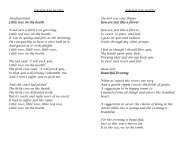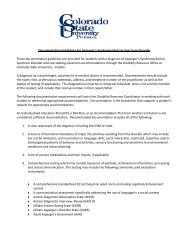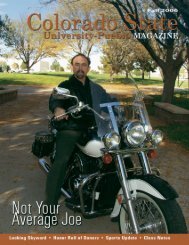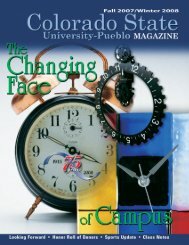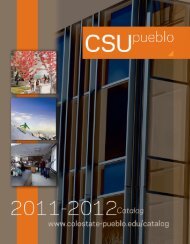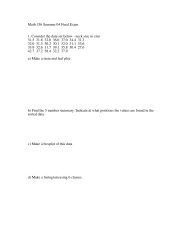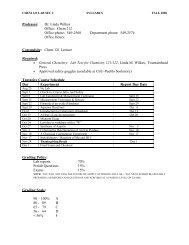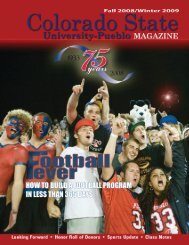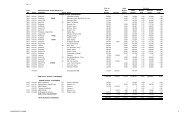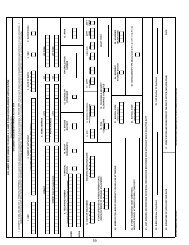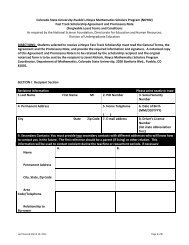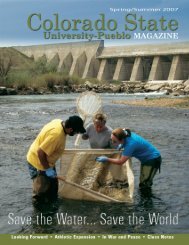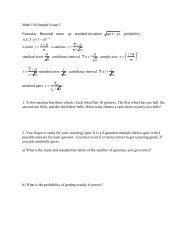2007-2008 Catalog (PDF) - Colorado State University-Pueblo
2007-2008 Catalog (PDF) - Colorado State University-Pueblo
2007-2008 Catalog (PDF) - Colorado State University-Pueblo
Create successful ePaper yourself
Turn your PDF publications into a flip-book with our unique Google optimized e-Paper software.
Admission<br />
High School <strong>University</strong> Program:<br />
Under <strong>Colorado</strong>’s Postsecondary Options Act, high<br />
school juniors and seniors may register for classes at<br />
the <strong>University</strong>. Students must submit an admission<br />
application approved by their high school counselor,<br />
principal and parents for each term they wish to enroll.<br />
In some cases, the high school district may pay<br />
students’ tuition. Students in the PSEO program are<br />
considered non-degree seeking students at the<br />
<strong>University</strong>. Information on such programs is available<br />
in the Office of Admissions.<br />
The <strong>University</strong> also offers a Senior-to-Sophomore<br />
(STS) program by agreement with various high school<br />
districts. High school students in this program are<br />
afforded the opportunity to study in university level<br />
courses while remaining in their high school classrooms<br />
and are considered unclassified students by the<br />
<strong>University</strong>. Students must submit an application for<br />
admission, transcript of their high school record and<br />
ACT or SAT scores. Those STS students who are in<br />
their senior year are given consideration for admission<br />
as regular first-time students for the fall semester<br />
following their high school graduation. Students<br />
interested in this program are encouraged to seek<br />
information from their high school guidance counselor<br />
or from the <strong>University</strong>’s Office of Continuing Education<br />
at 719-549-2316.<br />
Senior Citizens:<br />
Persons 65 years of age or older, or 62 and retired,<br />
may audit courses on a space-available, non-degree<br />
student basis without paying tuition. Permission of the<br />
instructor is required.<br />
RESIDENCE CLASSIFICATION<br />
A person moving to <strong>Colorado</strong> must be domiciled in the<br />
state for 12 continuous months before becoming<br />
eligible for a change in residence classification. To<br />
qualify for in-state classification for tuition purposes as<br />
a resident of <strong>Colorado</strong>, a person must do more than<br />
just reside in <strong>Colorado</strong> for the preceding 12 continuous<br />
months. “Residency” in this context means legal<br />
“domicile,” which requires intent to remain in <strong>Colorado</strong><br />
indefinitely in the sense of making one’s permanent<br />
home in the state. The distinction is that one may have<br />
any number of residences at one time, but never more<br />
than one domicile.<br />
Intent is determined by:<br />
1) The student’s written declaration of intent to<br />
remain in <strong>Colorado</strong> indefinitely, i.e., the student<br />
has no present intent to leave the state now or in<br />
the future;<br />
2) Documented evidence of overt actions that link<br />
the student to <strong>Colorado</strong>.<br />
Examples which establish intent are: payment of<br />
<strong>Colorado</strong> state income tax, a <strong>Colorado</strong> driver’s license,<br />
<strong>Colorado</strong> motor vehicle registration, the compliance<br />
with mandatory duty upon a domiciliary of the state,<br />
and voter registration. Obviously, the specific actions<br />
that establish intent vary according to the individual<br />
and the circumstances, but each individual must, with<br />
his/her circumstances, act consistently with the stated<br />
intent. An information brochure pertaining to the<br />
establishment of residency for tuition purposes may be<br />
obtained by writing to the Office of Admissions.<br />
A student’s classification as a <strong>Colorado</strong> resident for<br />
tuition purposes is made by the <strong>University</strong> at the time<br />
of admission, according to <strong>Colorado</strong> statutes. Any<br />
student classified as a nonresident who believes that<br />
he/she can qualify as a resident may obtain a petition<br />
and a copy of the statutes governing tuition<br />
classification from the Office of Admissions. The<br />
petition is processed only if the student has an<br />
application for admission on file or is currently enrolled.<br />
The petition is due no later than the day before the first<br />
day of class for the semester in which the change is<br />
requested. Deadlines are published in each semester<br />
class bulletin.<br />
Students 23 years of age or under who are independent<br />
from their parents must prove emancipation and<br />
demonstrate residency on their own qualifications.<br />
Students must notify the Student Financial Services<br />
Office if their status changes from resident to nonresident.<br />
Any student who willfully gives wrong<br />
information to avoid paying nonresident tuition is<br />
subject to legal and disciplinary action.<br />
A particularly relevant point is that one retains a former<br />
domicile until a <strong>Colorado</strong> domicile is established by the<br />
12-month residency.<br />
21



